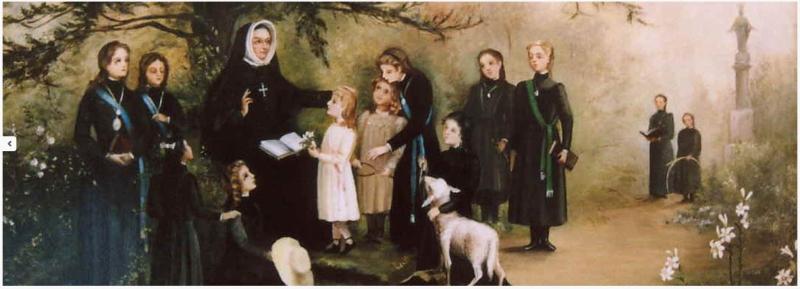
Feast: May 25
“Come in!”
Sophie, today is your feast, and I have been looking forward to this promised visit with you. I have so many things I want to ask you and I hope I remember them all!
The first thing I want to ask you is that you would give me – all of us --the true spirit of the Society. I want to live my vocation as you did and become as you dreamed that we all would be.
Sophie, I wish I could have overheard your conversations with Philippine during those early days at Grenoble, when you yourself were so young. And I wonder about those long visits you and Thérèse Maillucheau had about the mystics and contemplation and the Song of Songs you both loved so much.
If I had been one of that little community at Poitier in 1806 I could have watched how you were teaching the novices. I would have liked to have seen how you lived your daily life, how you related with your sisters and how you handled little situations of conflict. Tell me how you dealt with those who were your closest friends, like Philippine and Eugenie. And after 1818, I wish I could have seen the love and eager anticipation on your face as you opened one of Philippine’s letters from America.
I see in your letters how many times you say that you wanted to visit America, and I can imagine how such words would set Philippine and the American communities dreaming of a visit from you. I wonder how you would have resolved some of the difficult personnel problems in Louisiana if you had been on the spot. How frustrating it must have been for you, Sophie, to have been at such a distance. Impossible for us, with our instant communication world-wide, to imagine what those month-long delays in mail must have cost you!
Sophie, how were you able to keep your peace later on when some of your counselors and trusted nuns opposed you and worked against you behind your back? . . . And where did you find the strength and faith to support that terrible news of the deaths of seven young nuns at St. Michaels?
I’d like to learn from you how to really listen to people, how to act graciously with others when exhausted, when depressed or anxious, or when you were feeling ill or suffering for so long from that painful broken foot.
When one of the children amused you, Sophie, I would have loved to have heard your laughter, and I’d like to see how you dealt with those who were naughty.
Imagine being able to kneel behind you in that little tribune at the Villa Lante and watch you as you prayed. I wonder how you taught your nuns to pray. And, of course, when I think of the Villa Lante I remember your anguished prayer to Our Lady of Sorrows.
I’d like to ask you, Sophie, how you were able to write those thousands of letters, each one so direct, so personal, so tender. Your letters to your nuns, so down-to-earth, responding to their questions and their problems. For example, to Adrienne Michel, you wrote: “So you are very glad to have a room to yourself. I am, too, but in the fine weather you must go out into the garden and enjoy its beauty. If I could desire anywhere on earth to live, it would be your house. (Grenoble).” I notice that whenever you gave a correction or scolding you always followed it with an encouraging word.
I can almost see the affectionate humor on your face as you wrote of your niece, Sophie: “[She] is growing tall and becoming fearfully thin; the doctor forbids her much study. You can guess how delighted she is; one day she will be interesting, but not yet.”
I am amused to read your advice to Sister du Chastaignierin in 1815: “We are growing old, dear daughter, and vigor diminishes with age. If we fail to make headway now while we are growing old, shall we be able to walk at all when the evening of life has come?” Sophie, you still had fifty more years to live!
I remember that when you were 84 you wrote: We must not remain closed, bound in by routine, always following the beaten path. We often get into a rut after eighty.”
Sophie, I’m glad to see that saints are human! I enjoyed your letters to your dear friend, Thérèse Maillucheau, regarding that carpet she had made for the chapel at the Mother House. From Paris, July 11, 1819 you write: “I am so sorry you sent [the carpet] by diligence; it would have arrived on time by rolling express. But how surprised I was to learn on my return that this was a second carpet that you had undertaken to give me pleasure and to avoid giving us the first. You did well to hide this new enterprise from me, for I would never have consented to it. What distresses me still more is that the carpet is so dull that it cannot be used in our sanctuary, which is already very dark and would be even darker with that deep blue which would look like black in the light. Surely it would have been better in your chapel and the red one here … It is done now!”
And on July 15, “I can’t feel happy about that carpet; everyone who sees it says the same: ‘How ugly it is’ . . . Your choice of blue was not good, but if it had only been light blue! Did you consult Sister Bigeu at the beginning, she has good taste and could have dissuaded you. No one told me about it. I am a bit annoyed with all your daughters for this; please tell them so, but jokingly, for I don’t want to hurt them. Goodby, dear Thérèse. With very much love as always, your mother and friend, Sophie Barat”
August 20, Sophie wrote: “Please don’t send us your red carpet, dear Thérèse. If it is too big for your sanctuary, it would be much too big for ours.”
Finally, on August 25: “Don’t say any more about the carpet; all the details make it more distressing. 700 francs for its purchase alone, and we wouldn’t sell it for 300!”
Sophie, when you read of the incredible hardships and sufferings of your sisters in America, did you ever regret having sent them so far?
There are so many other things I want to ask you, Sophie, but I see my time is up. Thank you for this visit and now please bless all your daughters of the United States-Canada Province!
Mary (Be) Mardel, RSCJ



